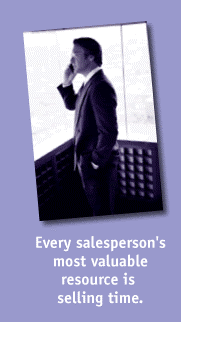
Getting Commitment on Every Sales Call
| Продажи | ||||
| Sales.com | ||||
| Managing | ||||
by Robert B. Miller and Stephen E. Heiman
Every time you go out on a sales call, by definition you have committed your own time and resources to a possible buy/sell relationship. The reason we stress the idea of getting commitment is because you should not be the only person in that relationship who has extended himself in this way.
 For
the sale to end up as a win-win, the seller must accept two responsibilities:
one to himself and one to the other party. But the buyer must accept those
two responsibilities,
also. Until your customer commits, you do not have win-win relationship.
For
the sale to end up as a win-win, the seller must accept two responsibilities:
one to himself and one to the other party. But the buyer must accept those
two responsibilities,
also. Until your customer commits, you do not have win-win relationship.
Sharing the commitment
On the first call to a new customer or prospect, you have no choice but to commit yourself. If you're going to write any business at all, you have to spend that initial time as a kind of seed money to get the ball rolling. And you have to be willing to risk it with no guarantee of customer commitment. But that's the first and last time you should sell from this position of unilateral risk. You cannot leave that first call, or any subsequent call, without involving the prospective buyer in commitment. Practically, this means every sales call must end with the customer understanding what he or she is going to do in order to move the process forward.
The customer must know, in other words, that if he's considering doing business with you, there is no free lunch. Both of you win, or nobody wins. The way your customer indicates to you that he's interested in having you win is by committing himself to do something before the next time you meet.
Commitment is a specific action step
His commitment has to be concrete and focused to a particular time frame. Vague promises to "think about the proposal" or "get back to you sometime next month" are meaningless signs of commitment. What you want, before the end of every sales call, is a promise to perform some action by a specified date. For example, "I'll give your proposal to the Planning Board this Friday," Or, "After I've had a chance to review these figures, I'd like to meet with you again before the end of the month." Specific actions, specific dates. Not an evasive "sometime" or "soon."
Expect commitment
In addition to being specific and related to a time frame, your customer's promise of action also has to demonstrate to you that he is willing to spend some of his time and resources, just as you have. If he's not willing to put himself out -- if he's not willing to share some of the risk of commitment with you -- then he's asking you to carry the freight by yourself. Translation: he doesn't care of you lose. He wants the free lunch -- and you pay. The only way to ensure that you don't end up in this kind of losing situation is to expect, and receive, commitment on every call.
Incremental commitment
But that's only the beginning. The second key point to remember about getting commitment is that, as your time and energy increase throughout the selling process, your customer's degree of commitment has to increase as well. Your customer's commitment to win-win, no less than yours, has to be incremental throughout a multi-call selling process. Otherwise you're just spinning your wheels.
At the initial stages of a selling process, the degree of customer commitment can, and probably will, be modest. If it's the first sales call you've ever made on Mr. Stein, you might be satisfied with the input you got about his organization's needs, and his commitment to set up a second meeting you others influencing the decision.
Building commitment
There's nothing wrong with that kind of low-level commitment as long as you're still getting started. But when you go back to Mr. Stein the next time, and you deal with the concerns he has about your literature, and you spend another hour of your time, then the commitment at the end of that second call had better be something more substantial. By the end of that call, you've put in lots of your company's time.
You might ask him to introduce you to the person who gives final approval, or to show your proposal to a relevant committee with his recommendation, or to give you the Finance Department's reaction to the preliminary specs that you've outlined. But whatever action he agrees to perform, it should indicate an increase in his commitment that will justify your spending more time.
Your selling time is valuable
The fundamental issue here is time. Every salesman's single most valuable resource is that precious commodity, selling time. We don't mean time in general, but the time you actually spend, face to face, with your prospects and clients. Nobody ever has enough of it. So it's essential that what you expend not be wasted. When you agree to commit your time to a customer without getting something in return you're saying, "My time is not as valuable as your, I'll do all the work on this sale if you'll only, please, please, give me an order." With that kind of relationship as a basis, even if you do get the order, eventually with this person you're going to lose.
Robert B. Miller and Stephen E. Heiman have worked in sales development for over thirty years. In 1978 they founded the company that became Miller Heiman, Inc., a Reno, Nevada-based Corporation that helps businesses develop sales processes. They are co-authors of Strategic Selling, Conceptual Selling and Successful Large Account Management